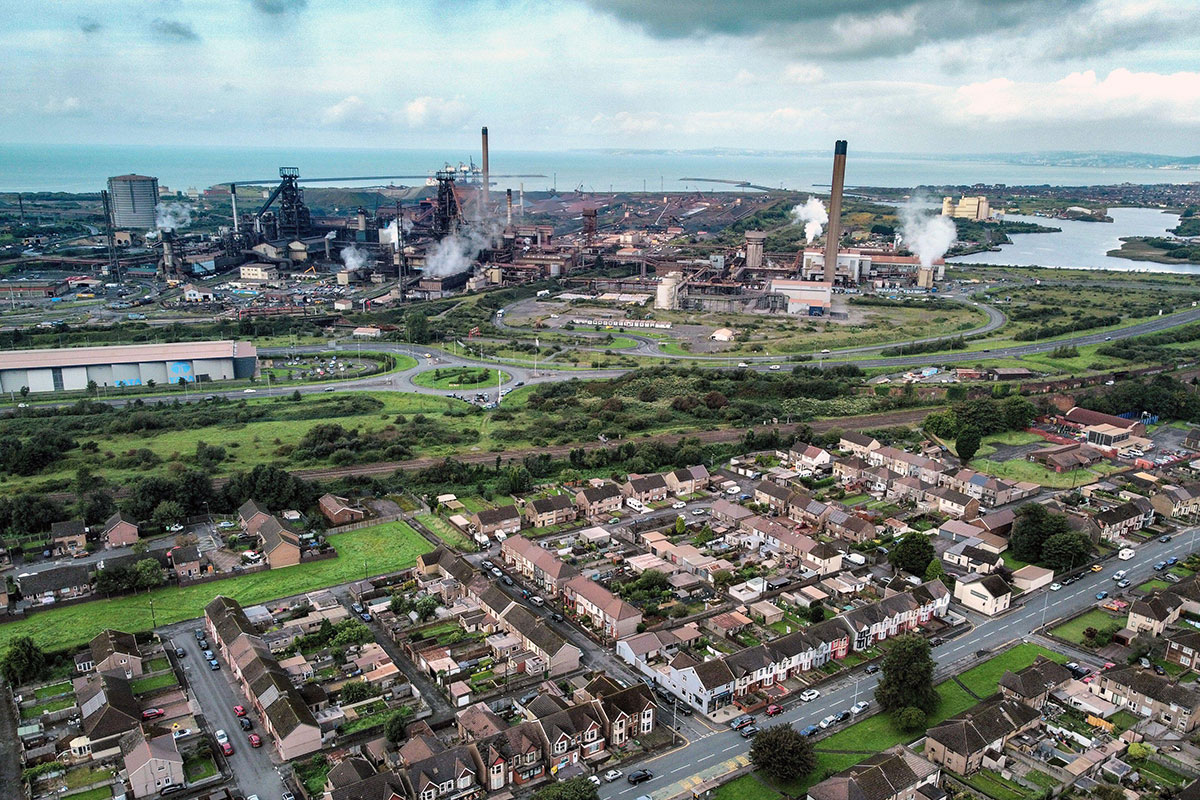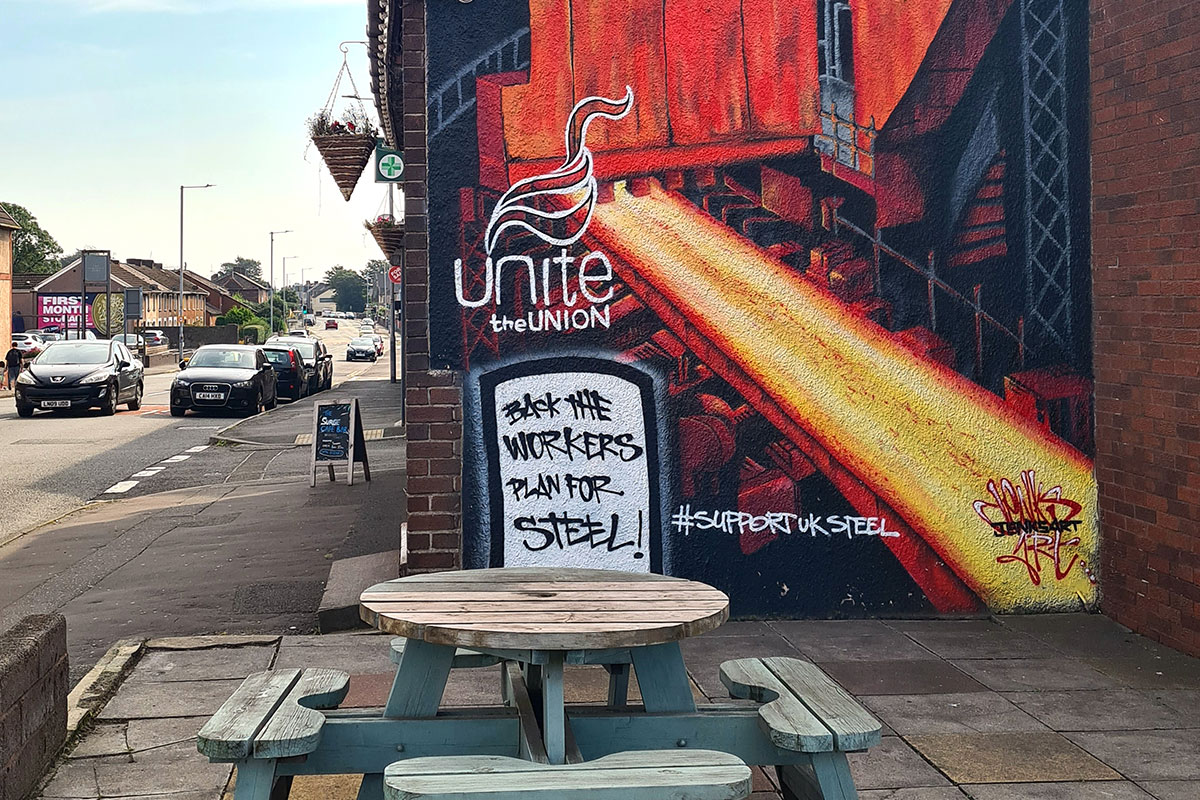You are viewing 1 of your 1 free articles
The housing association preparing for the closure of Tata Steel’s furnaces
Thousands of people are facing redundancy at Tata Steel. Katharine Swindells visits Port Talbot and speaks to Tai Tarian chief executive Linda Whittaker about how the housing association is preparing to help

Claire Lewis points out across the sand dunes of Port Talbot beach to the cranes – three metal structures, stark against the horizon. For years the locals have watched the cranes unload iron ore and coke from the ships for use in the blast furnace, but now they stand motionless. “Last week was the final delivery boat,” she says. “It was emotional to watch the cranes one last time.”
Talbot-born Ms Lewis owns Surge Cafe Bar, which is split down the middle – on one side, pool tables and fruit machines, and on the other, chintzy floral tablecloths. On the outside wall of her cafe is emblazoned a 10-foot high mural that reads: “Back the workers’ plan for steel!”.
“It’s this uncertainty we’ve been living in, that’s the worst part,” she states.
Ms Lewis gives me a lift down to the waterfront, where the outline of the cranes and steelworks against the sweeping golden sands is a striking visual reminder of the industry that looms over this town. “My uncle used to say they’d close one day and we never imagined it’d happen,” Ms Lewis says. “It’s traumatic.”
On 30 September, the final hole was drilled in the Port Talbot steelworks’ blast furnace, making it officially out of service. It marked the end of a year of uncertainty in this town on Wales’ south coast, after Tata Steel announced in September 2023 that it would be shutting down both blast furnaces to build a “more sustainable, green steel business” using an electric arc furnace.
The transition means around 2,800 job losses, as well as thousands more from contractors in the supply chain. In times of uncertainty, how can housing associations take on a key role as a pillar of the community? Inside Housing visited Port Talbot to find out.
The steelworks in Port Talbot is one of the largest in Europe. The current site is more than 70 years old, and was owned by the British Steel Corporation throughout the latter half of the 20th century, before it was bought by Tata in 2007. Today it is home to around 4,000 employees, more than half of Tata’s total UK workforce.
“The steelworks was really the last big manufacturing operation, and that has reduced and reduced. It would have been three times as large in the past, easily,” says Linda Whittaker, chief executive of 9,000-home Tai Tarian – the largest local social landlord.
“It might have been the most industrialised area in the whole of Wales. Everyone knows it for the steel, but we have lots of old mining communities here – we’ve had the BP refinery and in Bridgend, the Ford factory.”
Tai Tarian was formed via a stock transfer from Neath Port Talbot Council almost 15 years ago.
Everyone in Port Talbot knows someone who works at Tata Steel. Many of Tai Tarian’s staff are former Tata employees, including the communications manager who set up this interview. And many have partners or family members employed at Tata who are at risk of redundancy, so the uncertainty permeates the housing association as well as the rest of the town.
What will Tai Tarian be doing to support those who will lose their jobs? Ms Whittaker says there is still so much the landlord does not know. The council is preparing for knock-on effects on the housing waiting list and homelessness applications, but so far there has not been an uptick. The same is true for Tai Tarian’s internal financial inclusion team, which has not yet seen an increase but is prepared that it may come at any time.
“After people are made redundant, if they then don’t find something else, it may be quite a while before their redundancy package starts to run out,” Ms Whittaker says. “So it will be in the weeks, months and even years after the closure that we will still need to identify where we can help people.”
Ms Whittaker says Tai Tarian does not have a high number of tenants directly employed by Tata – as it pays well, many long-time employees are owner-occupiers. But she adds: “There are probably at least twice as many people who will lose their jobs, who are in the supply chain, than those directly employed by Tata. And they’re the ones that are more likely to be living in our properties.”

But these workers are far harder to identify than those directly employed by Tata, so Ms Whittaker says it is about building on the work done during the coronavirus pandemic to make sure all of Tai Tarian’s frontline staff are fully trained to identify if someone needs help and support.
The association also extended training to their other staff who come into regular contact with residents. It has a system where staff doing repairs can flag any household to refer them for a check-in if they think anything might be wrong. Ms Whittaker explains that after a survey of tenants found that grounds maintenance staff were the most trusted in the community, the landlord trained them all, too.
“Our vans are so recognisable. Our uniforms are so recognisable with our logo. Working within the community, and just having a real visible presence there, really helps,” she adds.
Tai Tarian is also using its influence beyond just its own tenants. In October last year, Neath Port Talbot Council set up a Tata Steel transition board that is headed by the secretary of state for Wales – formerly David TC Davies, and now Jo Stevens.
Ms Whittaker was asked to head up a subgroup on outplacements and skills, which organised sessions at the steelworks to help staff think about their future and how they can use funding available for retraining.
“When we’ve asked people what they might like to do, their answers have really ranged,” she says. “One guy said, ‘I’ve always liked the idea of being a landscape gardener.’ So I think there have been a lot of people thinking, ‘Let’s look at this as an opportunity. Let’s see if there’s something completely different that we can do.’”
Tai Tarian is also keen to promote itself as a potential career path. Tai Tarian is offering guaranteed interviews to anyone at risk of redundancy from Tata or the supply chain, who meets the minimum requirements for a role.
“I think that’s a real positive, so that people don’t feel, ‘What’s the point in applying to a housing association when I work in heavy industry, they’re not going to be interested,’” Ms Whittaker says. “And it gives those that are at risk of redundancy confidence that they’re not on their own.”
2,800
Job losses due to closure of Tata Steel’s blast furnaces
4,000
Employees at Tata Steel’s site in Port Talbot
9,000
Homes in the area managed by association Tai Tarian
Ms Whittaker says she wants this opportunity to reach all those losing their jobs in the steel industry, whether they are electricians, metalworkers, HR professionals or project managers. And Tai Tarian is working with those conducting the job interviews to make sure they can truly see the applicants’ potential.
“There are a significant number of those who will be made redundant who have no formal qualifications at all, but they have loads of experience,” she says. “The interviewers understand that some haven’t had an interview for 20 years, and they are patient and will try and get the best out of somebody. And even if they don’t get the job, then they’ve had a positive experience of an interview, to take to the next application.”
Job opportunities
Port Talbot is not the only place facing these challenges. In Scunthorpe, Ongo is also grappling with how to support the local community through job losses in the steel industry, as 3,000 are expected to be made redundant from British Steel by Christmas.
“The steelworks in Scunthorpe is what the town is built on and is one of the largest employers in the area. The announcement of more job losses will inevitably represent a significant challenge to the local community, economy and collective morale,” says Maryanne Fitzgerald, enterprise and economic social value manager at Ongo. “It’s always a time that spurs solidarity and resilience. Even those who aren’t directly affected might still feel anxious about the ripple effects.”
Ms Fitzgerald says the housing association will collaborate with the job centre and other stakeholders to offer job search support, CV writing workshops and interview preparation. It is also encouraging tenants to access support from Ongo’s financial inclusion team and apply for grants and funds if needed.
“Through talking to and listening to our tenants’ needs, we’ll continue to evolve our support measures during this time. We encourage everyone to get in touch, share their concerns and we’re always open to ideas.”
Back at Surge Cafe Bar in Port Talbot, Ms Lewis says it is not as simple as just finding new jobs for people. “It’s not easy to switch, especially for some of these older guys,” she says. “Their job is their identity. There will
be a huge mental health impact.”
Wayne, a customer at the cafe, weighs in. “A lot of people will leave Port Talbot to find other work,” he predicts. “It’ll be like a ghost town here.”

Ms Lewis gestures around the cafe. “We don’t know what the knock-on effect will be on all the businesses in the town. I doubt we’ll get money from the government, so I don’t know if we’ll survive.”
At Tai Tarian, Ms Whittaker says she feels very aware of the impact that the instability and unemployment will have on those affected, their families and the whole community.
“It’s not always financial, it’s also about self worth,” she says. “Especially when people have maybe been working for 35 or 40 years, the impact when people find themselves not having anything to do all day.”
This is where she hopes Tai Tarian’s training of its housing officers, tenancy sustainment teams and direct labour organisation workers will be vital. “Our guys are very good at picking up changes from when they have visited homes previously. They might be there for a plumbing job but pick up that, actually, the family’s not the same as they used to be.”
Ms Whittaker says she is optimistic that the collaboration seen on the transition board shows that the council and whole community understand that a holistic approach is needed.
“Having lived up in North Wales, when large industries have closed, including the steelworks up there, I think it was always very much focused on just jobs, jobs, jobs,” she says. “I think what’s different now is that we’re looking at well-being as well.”
The last sign of Port Talbot you see on the train ride out are the words printed across the steelworks: “The pride and passion of Welsh steelmaking”. With the steel furnaces finally gone, it will take the whole community together to hold on to that feeling.
Recent longform articles by Katharine Swindells
Top 50 Biggest Builders 2024
Which are the 50 housing associations building the most homes? What tenures are they building? And, with warnings already sounded about starts by the G15, what is happening to the pipeline? Katharine Swindells reports
Ready to check out: the lengthy repairs forcing tenants to live in hotels
Inside Housing has found tenants waiting months in temporary accommodation for repairs on their homes to be completed – or even started. Katharine Swindells reports
The estate where tenants are taking collective legal action on damp and mould
Tenants on one east London estate are teaming up to file a joint legal claim about the damp and mould in their homes. Katharine Swindells reports
The case for flooring to be included when social homes are let
Wales has just passed regulations that new social lets must come with flooring included. But with hundreds of thousands of families across the UK still living in social homes without carpet and flooring, should English and Scottish social landlords follow suit? Katharine Swindells reports
Sign up for our Wales newsletter
New to Inside Housing? Click here to register and receive our Wales round-up straight to your inbox
Already have an account? Click here to manage your newsletters











